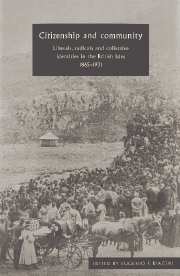 Citizenship and Community
Citizenship and Community Book contents
- Frontmatter
- Contents
- List of contributors
- Acknowledgements
- Introduction: Citizenship, liberty and community
- Part I Citizenship, populism and liberalism
- Part II Economic democracy and the ‘moral economy’ of free trade
- Part III Democracy, organicism and the challenge of nationalism
- Part IV Consciousness and society: the ‘peculiarities of the British’?
- Index
Introduction: Citizenship, liberty and community
Published online by Cambridge University Press: 16 September 2009
- Frontmatter
- Contents
- List of contributors
- Acknowledgements
- Introduction: Citizenship, liberty and community
- Part I Citizenship, populism and liberalism
- Part II Economic democracy and the ‘moral economy’ of free trade
- Part III Democracy, organicism and the challenge of nationalism
- Part IV Consciousness and society: the ‘peculiarities of the British’?
- Index
Summary
In 1883 the radical journalist W. E. Adams described community self-government and community representation as ‘the essence of all political liberalism that is worthy of the name’. His comment may serve as an opening statement for the present book. In contrast with the old Thatcherite or ‘Newt Gingrichite’ stereotypical image of ‘Victorian values’ – meaning individualism, self-help and laissez-faire – and the endorsement of similar myths by some socialist historians, we elaborate on the thesis that politics in the nineteenth and early twentieth centuries ‘was not primarily about the individual's rights, but the representation of his community’. The following chapters focus on the tension between concern for individual liberty and commitment to ‘community’: the latter included the citizen's ‘organic’ connections and the collective identities underpinning them. In particular, we suggest that ‘community’ was a crucial concept for both ‘advanced Liberals’ and supporters of other ‘currents of radicalism’ with which liberalism was allied, for example, free traders, revivalist dissenters, Celtic nationalists and activists in the women's movement.
This area has long called for a comprehensive reassessment for, though the relationship between liberalism, democracy and community ideologies has generated a great deal of theoretical discussion, it has not yet received sufficient attention from historians. Thus, very few studies explore the links between community-centred liberalism and free-trade economics in the Victorian and Edwardian United Kingdom.
- Type
- Chapter
- Information
- Citizenship and CommunityLiberals, Radicals and Collective Identities in the British Isles, 1865–1931, pp. 1 - 18Publisher: Cambridge University PressPrint publication year: 1996
- 1
- Cited by


